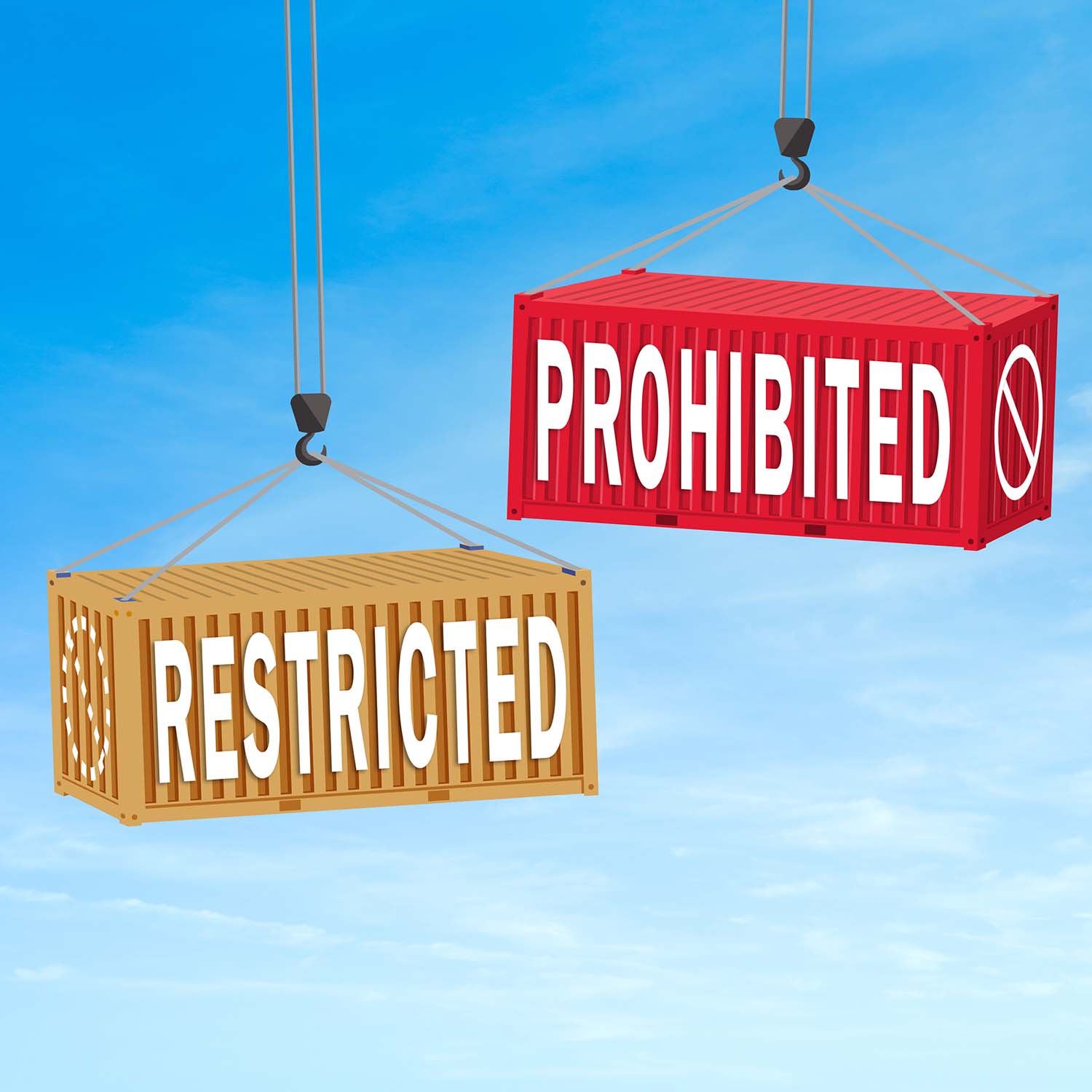Export: Restricted and Prohibited
Due to Brexit, the information contained in this article may not be accurate. As more information becomes available, this content will be updated.
Restrictions and Prohibitions
All countries restrict or prohibit the import and export of certain articles based upon:
- Concerns for health, safety, and public morality (e.g., foodstuffs, agricultural products, live animals, biologic materials, pharmaceuticals, illicit drugs, chemicals, hazardous products, and materials deemed indecent).
- Protection of the physical and economic security of the state (e.g., arms, armaments, dual-use technology, radio and television transmitters and receivers, radioactive materials, seditious materials, and currency).
- Economic protection or subsidization of domestic industry (e.g., non-tariff barriers to trade for imports and control of natural resources for exports).
- Enforcement of provisions of multi-lateral trade agreements (e.g., those designed to protect endangered and threatened species of animals and plants and those designed to protect copyright, patent, and trademark holders against infringement).
Restricted Articles
Examples of products restricted from export from the UK are:
Agricultural Products, Plants, and Foodstuffs
Export licenses for all food products are issued by the British Department for Environment, Food, and Rural Affairs (DEFRA).
- Some agricultural products require an export license. The products concerned are determined by the EU's Common Agricultural Policy and currently include cereals, rice, beef and veal, sugar, isoglucose, oils and fats, and milk and milk products.
- Foodstuffs must comply with EU Food Law, in addition to any requirements set forth by the country of destination. Fresh fruit and vegetables must comply with EU marketing standards, and export of these products may requite a certificate of conformity to those standards.
- All goods subject to phytosanitary controls (plants and vegetable products, including fresh fruit and vegetables)
- Tobacco products and alcohol
Live Animals and Food of Animal Origin
- Live animals (cattle, swine, equidae, live poultry, hatching eggs, sheep and goats), semen, and embryos require an export license.
- Wild plants and animals threatened with extinction, or products made from those plants or animals, are regulated under the Convention on International Trade in Endangered Species of Wild Fauna and Flora (CITES), and licenses are issued by the CITES Management Authority in the UK.
Cultural Goods
- Archaeological objects and cultural goods and documents and paintings require a license for export.
Pharmaceuticals and Medical Products
- Controlled narcotic drugs, psychotropic substances, and drug precursors, pharmaceutical products, and veterinary medicines
Dangerous Goods
- Dangerous chemicals
- Pesticides
- Ozone-depleting substances
- Waste products
- Weapons, firearms and ammunition, explosives, dual-use goods (see below), military and paramilitary goods (requires an export license from the Department for Business, Energy, and Industrial Strategy or BEIS)
- Radioactive substances and nuclear devices (requires an export license from BEIS)
Armaments and Dual-Use Goods
Some export restrictions and prohibitions enforce international treaties and agreements for peace and security. Exporting dual-use goods requires an export license from BEIS.
Dual-use articles and technologies require specific authorization depending on the country of destination of the goods:
- Community General Export Authorization applies to goods for shipment to Australia, Canada, Japan, New Zealand, Norway, Switzerland, and the United States of America
- Global National Export Authorization for repeated exports to some countries
- Individual Export Authorization for nonrecurring export orders
Diamonds
- Diamonds and diamond powder must be processed and certified under the Kimberly Process Certification Scheme.
Prohibited Articles
Some articles prohibited from being exported from the UK include:
- Counterfeit goods or pirated goods
- Offensive weapons
- Products that could be used for the death penalty, torture, or other cruel, inhuman, or degrading treatment (subject to licensing by customs)
- Psychoactive substances
- Meat and bone meal
- Cat and dog fur, and products made from cat or dog fur
- Some products from Myanmar, the Republic of Guinea, Iran, North Korea, Côte d'Ivoire, Zimbabwe, Sudan, and Libya
- Arms embargoes apply to the following countries: Armenia, Azerbaijan, Bosnia-Herzegovina, China, Democratic Republic of Congo, Iraq, Côte d'Ivoire, Lebanon, Liberia, Myanmar, North Korea, Rwanda, Sierra Leone, Somalia, Sudan, and Zimbabwe
Note: Export restrictions and prohibitions are subject to change. It is important to obtain the latest information from a customs broker, freight forwarder, or the local customs authorities.
Sources: Her Majesty’s Revenue and Customs or HMRC (www.gov.uk/government/organisations/hm-revenue-customs/services-information); Institute for Government (www.instituteforgovernment.org.uk)
Article written for World Trade Press by Brielle Burt, Jennifer Goheen, and Nina Bellucci.
Copyright © 1993—2024 World Trade Press. All rights reserved.

 United Kingdom
United Kingdom 